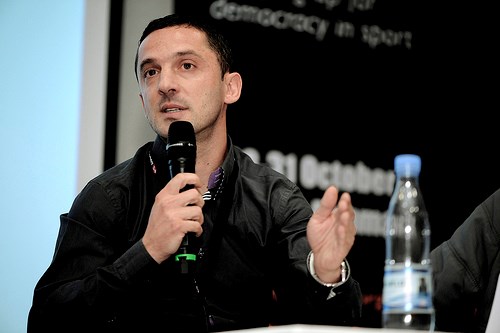Match-fixer: I did it to survive

Former Croatian football player Mario Čižmek talks about his personal encounter with match-fixing at the opening session of Play the Game 2013. Photo: Thomas Søndergaard/Play the Game
28.10.2013
By Kirsten SparreWhy? Because he wants to warn all football players against ending up like him: Sentenced to jail for match-fixing.
Čižmek was born in Croatia in 1975, and since the age of nine his life has been about football. It ended one day in June 2010 when police came to arrest him at his home in Zagreb. He was charged and later convicted of helping to fix the outcome of a number of matches in his club, FC Sesvete.
Čižmek does not want to go into too many details about how the fixes went down partly because his appeal is pending before the high court in Zagreb, and partly because he is worried about the criminals in Zagreb who run the fixes. But he does tell the audience at the Play the Game conference that eight players on the team worked together to ensure the desired outcomes:
"We lost because we did not give 100 per cent. Even a team of journalists could have won against us if they wanted to."
But Čižmek is an accomplished football player with an international career who would not normally consider running onto a football field with the aim of losing the match.
"Before 2010, I played more than 250 matches in the 1st league in Croatia, and I always played in a professional and responsible manner. I was completely honest and anything I achieved was down to hard work and my love for sport."
We only thought about surviving
So how could a player like Čižmek end up being banned for life from playing football in Croatia and facing a long prison sentence?
In his halting English, he tries to explain how his financial situation became increasingly difficult and towards the end downright desperate.
"The situation in the club was exceptionally bad. There was a financial crisis, bad conditions for training, and people on the board did not care for their "employees" and that was us - the players. I and the other players had not been paid a regular salary for 14 months and I owed money on taxes and my pension," he says.
"We had no money, and we no longer spoke about training or football, but only about how we were going to survive. Every other day we would ask whether we would be paid, and they would say "Yes, on Monday". Then we say, 'OK on Monday'. But there would be no pay on Monday - only a promise to be paid Wednesday, and then no money that day either. It went on for months, and the whole team sank into depression."
Moving to another club was not possible for contractual reasons and finding a job outside football was next to impossible for a player with no formal education. And that made him and the other players sitting ducks for the criminals who saw an opportunity to make money from gambling on fixed matches.
Match-fixing looked like a solution
"During those depressive days, one person showed up who was known to all of us from the local football society. It was a person that was a member of the Zagreb Football Association and he promised us a way out of the crisis. He said it was in cooperation with other clubs and the board of our club. He wanted us to fix the results of some of the games during the rest of the season.
It was about six games that were not important for the future of our club because we were already certain to fall out of the 1st league," Čižmek explains.
"And that is how it all began. One game after the other there was constant pressure, and we felt our souls were being eaten and we were deeply ashamed. The feeling was terrible but I could not go back.The organiser was present everywhere in our lives and he put pressure on us. Each game he would call us and tell us how and what we had to do to fulfill his expectations, and I sold my pride for small money compared to the loss that I feel and that I am living with today," Čižmek says.
No-one should end like me
24 players from three different clubs were implicated in what has been dubbed the OFFSIDE affair in Croatia. But Čižmek has been in the public eye more than anyone else. He has given interviews to international media, taken part in a documentary about the affair and is now talking about his experiences at conferences with the backing of the World Player's Union, FIFPro.
When you hear him speak, it is clear that he is not an attention seeker. He speaks quietly and is not looking for pity. He takes full responsibility for what he did and is deeply concerned that no-one else should end up in his position.
In 2010, there was no-one the players in his club could turn to for help. Now, FIFPro can provide some assistance but he would like to see action that will force clubs to treat their players properly.
"The main reason for match-fixing in our region is the action of clubs against players because they are not paid," he says.
Looking back on his actions, he says he should have hung up his football shoes and found something else to do.
"But at the time we were only thinking about surviving," he says.
Today his life is better. He is working on his family's fruit plantation producing tea, jam, and juice which he presents at conventions.
"Coming back to the field was like being reborn. I really like the work," he says. And adds: "But you don't make much money.
Read the full speech of Mario Čižmek





